
Should You Buy the MacBook Pro?
The 14-inch and 16-inch MacBook Pro models feature M4, M4 Pro, and M4 Max chips for super fast performance, with mini-LED displays, MagSafe fast charging, a range of ports, and more. Apple refreshed the MacBook Pro models in October 2024, which means now is a good time to buy.
Another update isn't expected until late 2025 at the earliest, and that update will be just a chip refresh. A more significant update with OLED display technology and perhaps other design changes is coming in 2026.

The entry-level 14-inch M4 MacBook Pro is priced starting at $1,599, while the M4 Pro chip version is priced starting at $1,999. The 14-inch MacBook is the only model that can be purchased with an M4, M4 Pro, or M4 Max chip. The higher-end 16-inch MacBook Pro is priced starting at $2,499, and it can be bought with the M4 Pro or M4 Max chip.
Apple's M4-series chips are built on a 3-nanometer process, featuring faster speeds, AI optimization for Apple Intelligence, and efficiency improvements for better battery life.
If you don't need such the performance capabilities of the MacBook Pro, the port options, or features like the mini-LED display, you'll want to consider Apple's more affordable MacBook Air models instead.
- 14-Inch vs. 16-Inch MacBook Pro Buyer's Guide 2024
- MacBook Air vs. MacBook Pro Buyer's Guide: 30+ Differences Compared
- M4 vs. M4 Pro vs. M4 Max Chip Buyer's Guide: Which Should You Choose?
- M3 vs. M4 Chip Buyer's Guide: How Much Better Really Is M4?
- M1 vs. M2 vs. M3 vs. M4 MacBook Pro Buyer's Guide: 30+ Differences Compared
If you're considering a MacBook Pro, we have a dedicated Deals guide that lists the best prices and discounts that we've seen this month.
The M4 MacBook Pro Models
Contents
Apple in October 2024 overhauled the 14-inch and 16-inch MacBook Pro models, adding next-generation M4, M4 Pro, and M4 Max chips, Thunderbolt 5 ports on higher-end models, display changes, and a few other updates.
The M4 MacBook Pro models have not received a design update, and continue to come in 14.2-inch and 16.2-inch size options with mini-LED displays. The MacBook Pro models come in space black or silver aluminum and feature large trackpads and full-sized keyboards. This year's changes are internal, largely focused on the updated M-series chips.
The M4 chip has a 10-core CPU and 10-core GPU, while the M4 Pro chip has a 14-core CPU and up to a 20-core GPU. The high-end M4 Max has up to a 16-core CPU and up to a 40-core GPU. All of the new chips support hardware-based ray tracing and mesh shading for better gaming performance, along with an increase in memory bandwidth.
Apple's M4 chips all include a 16-core Neural Engine for powering on-device Apple Intelligence features and machine learning tasks.
The M4 chip supports up to 32GB Unified Memory, while the M4 Pro supports up to 64GB. The M4 Max supports up to 128GB Unified Memory. The M4 features 120GB/s memory bandwidth, the M4 Pro offers 273GB/s memory bandwidth, and the M4 Max features up to 546GB/s memory bandwidth.
The 14-inch and 16-inch MacBook Pro models feature a Liquid Retina XDR display, which is a mini-LED display with an improved 1000 nits SDR brightness outdoors, up to 1000 nits sustained XDR brightness, 1600 nits peak brightness, and a 1,000,000:1 contrast ratio. The 14-inch MacBook Pro has a resolution of 3024-by-1964 at 254 pixels per inch, and the 16-inch model has a resolution of 3456-by-2234 at 254 pixels per inch.
Display sizes have not changed in 2024, but Apple added an option to upgrade the MacBook Pro with a nano-texture display that reduces glare, and there is also support for 1 nit minimum brightness for the first time.
There are slim 3.5mm bezels at the sides and the top, and the top of the display also features a notch design that houses a new 12-megapixel webcam that supports Center Stage and Desk View. Both displays come equipped with ProMotion technology, which supports adaptive refresh rates up to 120Hz. Other display technologies include P3 Wide color for true-to-life colors and True Tone, which shifts the white balance of the display to match the lighting in the room.
Design wise, the M4 MacBook Pro models are identical to the prior-generation M3 MacBook Pro models. There's an all-black keyboard with a full-sized row of function keys, along with a Touch ID button with a circular fingerprint sensor. Touch ID is used unlock the Mac, authenticate purchases, and replace passwords. Below the keyboard, there's a large Force Touch trackpad.
Apple is using the same rearchitected thermal design that provides sustained performance while keeping the machine cool and quiet even with the more powerful M4 Pro and M4 Max chips.
There are multiple ports included with both MacBook Pro models, including an SDXC card slot, an HDMI 2.1 port, three USB-C Thunderbolt 4 ports for the M4 and three USB-C Thunderbolt 5 ports for the M4 Pro/Max models, a 3.5mm headphone jack with support for high-impedance headphones, and a MagSafe 3 port that enables a fast charging feature providing a 50 percent charge within 30 minutes.
The 16-inch MacBook Pro uses a 140W power adapter while the 14-inch models ship with either a 70W or 96W power adapter depending on chip configuration, and all of the MacBook Pro models can charge over either USB-C or MagSafe.
There are fast SSDs inside the MacBook Pro models, which are configurable with up to 8TB storage space in both models, though the MacBook Pro with standard M4 chip is limited to 2TB and the M4 Pro models are limited to 4TB.
Thanks to the new M4 chips, the MacBook Pro models feature even longer battery life. The 14-inch MacBook Pro with M4 chip lasts for up to 24 hours when watching movies and 16 hours when browsing the web. The 14-inch MacBook Pro with M4 Pro lasts for up to 22 hours when watching movies and up to 14 hours when browsing the web, while the M4 Max lasts for up to 18 hours when streaming video and 13 hours when browsing the web.
On the 16-inch MacBook Pro, models with the M4 Pro chip last for up to 24 hours while streaming video and up to 17 hours while browsing the web. Models with the M4 Max chip get up to 21 hours while streaming video and up to 14 hours while browsing the web.

Other features include Wi-Fi 6E and Bluetooth 5.3 support, with Wi-Fi 6E offering faster wireless connectivity and lower latency through the 6GHz band. The MacBook Pro models also include a six-speaker sound system with two tweeters, four force-cancelling woofers, and wide stereo sound.
The 14-inch MacBook Pro is priced starting at $1,599, with M4 Pro models starting at $1,999. The 16-inch MacBook Pro with M4 Pro is priced starting at $2,499 with M4 Max models starting at $3,499.
Note: See an error in this roundup or want to offer feedback? Send us an email here.
How to Buy
The 14-inch and 16-inch MacBook Pro models can be purchased from Apple's online store and other retailers.
Reviews
While the MacBook Pro didn't get major external changes, reviewers were still impressed with the internal updates and the new display features.
The Verge praised the nano-texture display for its glare reduction properties, and said it's a worthwhile upgrade for visual pros because it improves working conditions in areas with less-than-ideal lighting. TechCrunch agreed, and said it's great for outdoor use.
The upgraded 12-megapixel webcam is a solid addition, with Engadget calling it "a major leap" over the prior version. Video is much sharper, with more accurate colors. It also supports Center Stage and Desk View.
Reviewers thought the standard M4 chip provided noticeably better performance than the M3, and it outperformed Windows PCs with some of the latest chips like the Snapdragon X Elite.
For more opinions on the new MacBook Pro, check out our MacBook Pro review roundup.
Design
Apple in 2021 overhauled the MacBook Pro inside and out, refining the well-known aluminum unibody design with a flatter shape and a reduced curve at the bottom. With the October 2024 refresh, Apple has not introduced any design changes, and the MacBook Pro models appear identical to the 2021 models for the fourth consecutive generation.
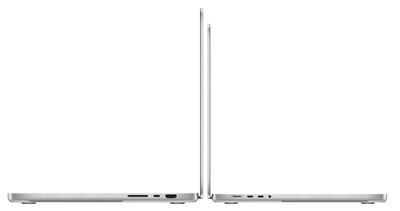
Apple offers the MacBook Pro in silver and space black aluminum color options, and it can be purchased in 14- and 16-inch sizes. There are slim bezels at the top and the sides, a notch at the top for the camera, a keyboard that's all black, a large trackpad, and additional ports at the left and right sides. There continues to be a large Force Touch trackpad, and there are two speaker grilles at the sides of the keyboard.
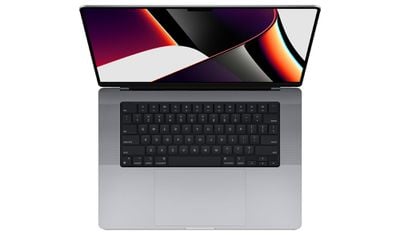
According to Apple, the space black MacBook Pro has an "anodization seal" that is designed to cut down on fingerprints. Hands-on tests of the seal when it debuted in the M3 models suggested that the color is indeed more resistant to fingerprints.
The 14-inch model measures in at 12.31 inches (31.26 cm) long, 8.71 inches (22.12 cm) wide, and 0.61 inches (1.55 cm) thick, and it weighs in at 3.4 pounds (1.55 kg) with the M4 chip, 3.5 pounds (1.61 kg) with the M4 Pro chip, and 3.6 pounds (1.62 kg) with the M4 Pro Max chip.
The 16-inch model measures in at 14.01 inches (35.57 cm) long, 9.77 inches (24.81 cm) wide, and 0.66 inches (1.68 cm) thick. It weighs in at 4.7 pounds (2.14 kg) with the M4 Pro chip or M4 Max chip.

Internally, the design of the MacBook Pro maximizes internal space and is machined around an advanced thermal system that optimizes air movement to cut down on how often the fans activate. The MacBook Pro machines are designed to provide high performance while remaining cool and quiet, and for most everyday tasks, the fans do not turn on.
Display
Both MacBook Pro models are equipped with a "Liquid Retina XDR (Extreme Dynamic Range) display," which uses mini-LED technology. The 16-inch MacBook Pro features a 16.2-inch display with a 3456-by-2234 native resolution at 254 pixels per inch.

The 14-inch MacBook Pro includes a 14.2-inch display with a 3024-by-1964 native resolution at 254 pixels per inch. Aside from differences in size and the resulting difference in resolution, the displays of the 14- and 16-inch models are identical.
Both are using mini-LED technology with 1000 nits sustained XDR brightness, 1000 nits outdoor SDR brightness, and 1600 nits peak brightness, with a contrast ratio of 1,000,000:1 and 1 nit minimum brightness. The displays offer support for a billion colors, along with P3 Wide color for bright, true-to-life colors.
According to Apple, users can expect HDR content to come to life with more detail in shadows, brilliant highlights, deeper blacks, and more vivid colors than were previously available. This is enabled through the 10,000 mini-LEDs that are grouped into individually controlled local dimming zones.
When displaying SDR content, the display can deliver a peak brightness of 1000 nits in outdoor light, 400 nits brighter than the prior model. The display's 1600 nits peak brightness capability is reserved for HDR content only.
True Tone, a feature that is designed to match the white balance of the display to the ambient lighting in the room, is supported. Apple devices have used True Tone for years, and it is designed to make viewing a Mac's screen easier on the eyes because it takes into account outside lighting and color temperature.
The MacBook Pro models support ProMotion technology for adaptive refresh rates up to 120Hz. When viewing a static webpage that doesn't require a high refresh rate, the MacBook Pro's display adopts a lower refresh rate to preserve battery life, but when gaming, scrolling, or doing other activities where a higher refresh rate is needed for smoother content, the higher frame rates kick in.
Keyboard and Trackpad
The 2024 MacBook Pro features the same all-black keyboard base that was used in the 2023 MacBook Pro models. There is a full-sized row of function keys along with a large Escape key on the left side. The right side features a power button with a circular Touch ID fingerprint reader.
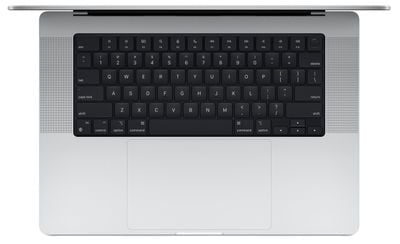
Apple includes arrow keys in the traditional inverted T-arrangement, and this is a scissor switch keyboard that is more durable than the butterfly keyboard that Apple used in some prior MacBook Pro models. It holds up better to crumbs, dust, and debris, which could cause failure with the older MacBook Pro keyboards.
All of the keys are backlit and adjust based on the lighting in the room thanks to an ambient light sensor.
Below the keyboard, there's a large Force Touch trackpad that is unchanged from prior models. The Force Touch trackpad has no traditional buttons and is powered by a set of Force Sensors, allowing users to press anywhere on the trackpad to get the same response. A Taptic Engine powered by magnets provides users with tactile feedback when using the trackpad, replacing the feel of a physical button press.
The Force Touch trackpad supports a light press, which is used as a regular click, along with a deeper press or "force click" as a separate gesture that does things like offer up definitions for a highlighted word.
Ports
The M4 MacBook Pro models feature a selection of different port options for connecting displays and peripherals, and charging.
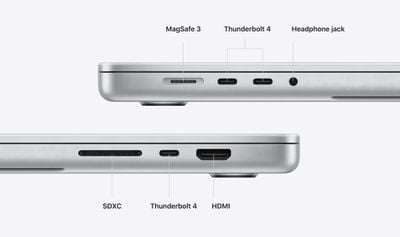
All 14-inch and 16-inch MacBook Pro models include a UHS-II SDXC card slot, an HDMI 2.1 port that supports a 4K display at up to 240Hz or an 8K display at up to 60Hz, and a 3.5mm headphone jack.
The 14-inch MacBook Pro with M4 chip includes three Thunderbolt 4 (USB-C) ports, while all other models include three Thunderbolt 5 ports. The Thunderbolt 4 ports support speeds of up to 40Gb/s in addition to serving as a DisplayPort and allowing for charging, while the Thunderbolt 5 ports support speeds up to 120Gb/s.
There is a dedicated MagSafe port and an accompanying braided MagSafe cable for charging. MagSafe offers a breakaway design that allows the cable to easily disconnect if it's pulled, preventing damage to the port or machine.

The MagSafe port also offers faster charging on the 16-inch machine than you can get over USB-C, but both machines can charge over MagSafe or the included Thunderbolt ports.
M4, M4 Pro, and M4 Max Chips
The 14-inch and 16-inch MacBook Pro models can be configured with three chips, the M4, the M4 Pro, and the M4 Max. The 14-inch model can be purchased with any of the three chips, while the 16-inch machine is available with the M4 Pro or the M4 Max.
The M4 chip has an 10-core CPU and a 10-core GPU, while the M4 Pro has a 14-core CPU and up to an 20-core GPU. The M4 Max has up to a 16-core CPU and up to a 40-core GPU.

The M4 chips are built on Apple's next-generation N3E 3-nanometer architecture. Like the M3 chips, the M4 chips have updated graphics architecture that brings faster and more efficient GPU technology. The M4 GPUs support Dynamic Caching, hardware-accelerated ray tracing, and mesh shading.
Dynamic Caching allocates the use of local memory in hardware in real time, so only the exact amount of memory needed is used for each task. It increases the average utilization of the GPU, thereby increasing performance for demanding pro apps and games.
With hardware-accelerated ray tracing, light looks more realistic as it interacts with a scene, allowing for more physically accurate images. Game developers can use the ray-tracing and mesh shading for more accurate shadows and reflections as well as more efficient geometry processing.
Apple says the M4 is up to 1.8x faster than the M1 chip, while the M4 Pro is up to 3x faster than the M1 Pro. The M4 Max is up to 3.5x faster than the M1 Max.
In Geekbench benchmarks, the 14-core M4 Pro chip earned single-core scores of roughly 3800, and multi-core scores of 22,000. That means the M4 Pro with the 14-core CPU is faster than the 24-core M2 Ultra chip that's in the Mac Studio. It is up to 45 percent faster than the highest-end M3 Pro chip.
The 16-core M4 Max earned single-core scores of 4000 and multi-core scores of 26,675, which means it is significantly faster than the 24-core M2 Ultra chip. It is up to 20 percent faster than the M4 Pro.
As for the Metal benchmarks, the M4 Pro with 20-core GPU earned a score of 110,556, which means it is approximately 40 percent faster than the M3 Pro in terms of GPU speeds.
The M4 Max with 40-core GPU earned a score of 190,329, which means it is up to 25 percent faster than the equivalent M3 Max chip.
Media Engine
Apple includes a media engine in its Apple silicon chips to speed up video processing while preserving battery life. The M4 offers dedicated acceleration for the ProRes video codec, along with video encode/decode engines and hardware accelerated support for H.264, HEVC, ProRes, and ProRes RAW.
The M4 Max has the same capabilities, but it includes two video encode engines and two ProRes encode and decode engines for even faster performance for pro tasks.
Memory
The M4, M4 Pro, and M4 Max use a system-on-a-chip architecture with unified memory and unmatched power efficiency, and all models feature faster memory this year. Apple has updated the minimum RAM to 16GB, so all models have at least 16GB RAM.
The M4 supports up to 32GB unified memory, the M4 Pro supports up to 64GB unified memory, and the M4 Max supports up to 128GB unified memory.
Apple's M4 chip provides up to 120GB/s memory bandwidth, while the M4 Pro provides up to 273GB/s. The M4 Max chip delivers up to 410GB/s for the 14-core CPU model, and up to 546GB/s for the 16-core CPU model.
Neural Engine
There's a 16-core Neural Engine built into the M4 chips that handles Apple Intelligence and machine learning acceleration and boosts camera performance alongside the custom image signal processor, plus there's a display engine that can drive multiple external displays.
Display Support
The M4 and M4 Pro chips support two external displays at 6K resolution at up to 60Hz, or one external display at 8K resolution up to 60Hz or one display at 4K resolution at 240Hz.
The M4 Max supports up to four external displays, including three at up to 6K resolution at 60Hz over Thunderbolt and one at up to 4K resolution at 144Hz over HDMI.
Alternatively, it supports up to two external displays with 6K resolution at 60Hz over Thunderbolt and one display with up to 8K resolution at 60Hz or one external display with 4K resolution at 240Hz over HDMI.
There are additional integrated Thunderbolt controllers for more I/O bandwidth, and a built-in Secure Enclave provides features like hardware-verified secure-boot and runtime anti-exploitation features.
High Power Mode
All MacBook Pro models with the M4 Max chip have a "High Power" mode that's designed for intensive, sustained workloads. In this mode, performance is optimized for system-intensive tasks, which can result in louder fan noise.
High Power Mode can be enabled in System Settings under Battery > Power Adapter > Energy Mode when connected to a power source or under Battery > Battery > Energy Mode when running on battery.
Fine print in System Preferences indicates that High Power Mode may result in louder fan noise, suggesting that the feature allows the M4 Max chip to run hotter and ramps up fan speeds to accommodate this.
Apple says that High Power Mode is designed to maximize performance during intensive, sustained workloads, providing users with "extreme performance" for tasks like color grading 8K ProRes video.
Other Features
Speakers
There's a high-fidelity six-speaker sound system in the MacBook Pro that includes two tweeters and four force-cancelling woofers for 80 percent more bass.
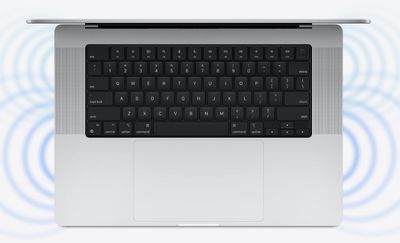
The speaker system supports wide stereo sound, and the MacBook Pro offers support for spatial audio when playing music or video with Dolby Atmos on the built-in speakers. When connected to the AirPods, AirPods Pro, or AirPods Max, dynamic head tracking is supported.
There's also a three-microphone array that supports a high signal-to-noise ratio with a 60 percent lower noise floor that can capture even subtle sounds. Directional beamforming allows for crisp, clear voice sound.
SSDs
The MacBook Pro models feature SSDs with up to 8TB of storage space available. The SSDs support speeds up to 7.4GB/s.
Camera
There is a 12-megapixel camera in the MacBook Pro, which is bolstered by the image signal processor built into the M4 chips. The image signal processor makes sure images are sharp, and allows for natural-looking skin tones, and there's also the option to use an iPhone as a webcam.

The camera supports Center Stage for keeping you in frame, and it works with Desk View, so you can show what's on your physical desk in front of you if needed on a video call.
Wireless Connectivity
The MacBook Pro supports 802.11ax Wi-Fi 6E connectivity and Bluetooth 5.3. Wi-Fi 6E supports the 6GHz band offered by compatible routers for more bandwidth and less latency. Wi-Fi 6E is only useful when paired with a Wi-Fi 6E router, but it is a technology that is becoming more widespread.
Bluetooth 5.3 offers less interference, lower power consumption, improved encryption, a better experience for those who use Bluetooth for connecting things like hearing aids, and improved throughput.
Battery Life
The 14-inch MacBook Pro with M4 chip lasts for up to 24 hours when streaming video or up to 16 hours when browsing the web. The 14-inch MacBook Pro models with M4 Pro chip last for up to 22 hours when streaming video or up to 14 hours when browsing the web.
The 14-inch M4 Max MacBook Pro lasts for up to 18 hours when streaming video or up to 13 hours when browsing the web. All 14-inch models have a 72.4-watt-hour battery.
Apple's 16-inch MacBook Pro models with M4 Pro chip last for up to 24 hours when streaming video and 17 hours when browsing the web, while the M4 Max lasts for up to 21 hours when streaming video or 14 hours when browsing the web. The 16-inch MacBook Pro models are equipped with a 100-watt-hour lithium-polymer battery.
16-inch MacBook Pro models with the M4 chip family are able to fast charge with MagSafe or USB-C when using a 240W USB-C cable and the 140W power adapter that comes with the device.
The 14-inch MacBook Pro models can fast charge with a 96W USB-C power adapter, though models equipped with the base M4 or the 12-core M4 Pro ship with a 70W adapter by default).
Available Models
There are six stock configurations of the 14-inch MacBook Pro, and four 16-inch MacBook Pro configurations. These are models that are in stock at Apple retail locations and do not require build-to-order updates.
14-inch MacBook Pro Models
- $1,599 - M4 with 10-core CPU and 10-Core GPU, 16GB RAM, 512GB SSD.
- $1,799 - M4 with 10-core CPU and 10-Core GPU, 16GB RAM, 1TB SSD.
- $1,999 - M4 with 10-core CPU and 10-Core GPU, 24GB RAM, 1TB SSD.
- $1,999 - M4 Pro with 12-core CPU and 16-core GPU, 24GB RAM, 512GB SSD.
- $2,399 - M4 Pro with 14-core CPU and 20-core GPU, 24GB RAM, 1TB SSD.
- $3,199 - M4 Max with 14-core CPU and 32-core GPU, 36GB RAM, 1TB SSD.
16-inch MacBook Pro Models
- $2,499 - M4 Pro with 14-core CPU and 20-core GPU, 24GB RAM, 512GB SSD.
- $2,899 - M4 Pro with 14-core CPU and 20-core GPU, 48GB RAM, 512GB SSD.
- $3,499 - M4 Max with 14-core CPU and 32-core GPU, 36GB RAM, 1TB SSD.
- $3,999 - M4 Max with 16-core CPU and 40-core GPU, 48GB RAM, 1TB SSD.
Build to Order Options
In most of the MacBook Pro models, the M4 chips can be upgraded, and there are also upgrades for the SSD and the memory. Options per model and pricing are available below.
Base Model M4 14-Inch MacBook Pro Upgrade Options
- Nano-texture display - +$150
- 24GB Memory - +$200
- 32GB Memory - +$400
- 1TB SSD - +$200
- 2TB SSD - +$600
- 96W Power Adapter - +$20
Upgraded M4 14-Inch MacBook Pro Upgrade Options
- Nano-texture display - +$150
- 24GB Memory - +$200
- 32GB Memory - +$400
- 2TB SSD - +$400
- 96W Power Adapter - +$20
Higher-End M4 14-Inch MacBook Pro Upgrade Options
- Nano-texture display - +$150
- 32GB Memory - +$200
- 2TB SSD - +$400
- 96W Power Adapter - +$20
Base M4 Pro 14-Inch MacBook Pro Upgrade Options
- Nano-texture display - +$150
- M4 Pro w/ 14-core CPU and 20-core GPU - +$200
- M4 Max w/ 14-core CPU and 32-core GPU - +$800
- M4 Max w/ 16-core CPU and 40-core GPU - +$1100
- 36GB Memory (M4 Max required) - +$200
- 48GB Memory - +$400
- 64GB Memory (M4 Max required) - +$600
- 128GB Memory (M4 Max required) - +$1400
- 1TB SSD - +$200
- 2TB SSD - +$600
- 4TB SSD - +$1200
- 8TB SSD (M4 Max required) - +$2400
- 96W Power Adapter - +$20
Middle Tier M4 Pro 14-Inch MacBook Pro Upgrade Options
- Nano-texture display - +$150
- M4 Max w/ 14-core CPU and 32-core GPU - +$600
- M4 Max w/ 16-core CPU and 40-core GPU - +$900
- 36GB Memory (M4 Max required) - +$200
- 48GB Memory - +$400
- 64GB Memory (M4 Max required) - +$600
- 128GB Memory (M4 Max required) - +$1400
- 1TB SSD - +$200
- 2TB SSD - +$400
- 4TB SSD - +$1000
- 8TB SSD (M4 Max required) - +$2200
High-End M4 Max 14-Inch MacBook Pro Upgrade Options
- Nano-texture display - +$150
- M4 Max w/ 16-core CPU and 40-core GPU - +$300
- 48GB Memory - +$200
- 64GB Memory - +$400
- 128GB Memory - +$1200
- 2TB SSD - +$400
- 4TB SSD - +$1000
- 8TB SSD - +$2200
Base Model M4 Pro 16-Inch MacBook Pro Upgrade Options
- Nano-texture display - +$150
- M4 Max w/ 14-core CPU and 32-core GPU - +$600
- M4 Max w/ 16-core CPU and 40-core GPU - +$900
- 36GB Memory (M4 Max required) - +$200
- 48GB Memory - +$400
- 64GB Memory (M4 Max required) - +$600
- 128GB Memory (M4 Max required) - +$1400
- 1TB SSD - +$200
- 2TB SSD - +$600
- 4TB SSD - +$1200
- 8TB SSD (M4 Max required) - +$2400
Middle-Tier M4 Pro 16-Inch MacBook Pro Upgrade Options
- Nano-texture display - +$150
- M4 Max w/ 14-core CPU and 32-core GPU - +$400
- M4 Max w/ 16-core CPU and 40-core GPU - +$900
- 64GB Memory - +$200
- 128GB Memory - +$1000
- 1TB SSD - +$200
- 2TB SSD - +$600
- 4TB SSD - +$1200
- 8TB SSD (M4 Max required) - +$2400
Higher-End M4 Max 16-Inch MacBook Pro Upgrade Options
- Nano-texture display - +$150
- M4 Max w/ 16-core CPU and 40-core GPU - +$300
- 48GB Memory - +$200
- 64GB Memory - +$400
- 128GB Memory - +$1200
- 2TB SSD - +$400
- 4TB SSD - +$1000
- 8TB SSD - +$2200
Highest-End M4 Max 16-Inch MacBook Pro Upgrade Options
- Nano-texture display - +$150
- 64GB Memory - +$200
- 128GB Memory - +$1000
- 2TB SSD - +$400
- 4TB SSD - +$1000
- 8TB SSD - +$2200
What's Next for the MacBook Pro
The MacBook Pro models are expected to get an overhaul with OLED display technology and a thinner design in 2026 or 2027, with just a small performance boost coming at in early 2026. The next MacBook Pro models will have the M5, M5 Pro, and M5 Max chips, but few other changes are expected.
Future OLED MacBook Pro models may not have a notch on the display, and could instead adopt a hole-punch camera that takes up less display space. A hole-punch camera would allow for more space on the menu bar.
Apple is working on an all-display foldable notebook in the MacBook family, which will measure in at 18.8 inches. According to display analyst Ross Young, this device would be a new product category for Apple, providing a notebook with a full-size on-screen keyboard when folded, and functionality as a standard monitor when unfolded and paired wth an external keyboard. Such a device is not coming in the near future, and there's no concrete word on when it might come.
A future version of the MacBook Pro could include 5G connectivity, as Apple is rumored to be "investigating" the possibility of debuting a cellular Mac. A Mac with 5G isn't expected to launch until 2026 or later.
An updated Magic Mouse with touch controls, voice controls, and hand gesture support could debut alongside MacBook Pro models in 2026. The refreshed mouse is expected to have a more ergonomic design as well, with Apple entirely overhauling the look of the device.

